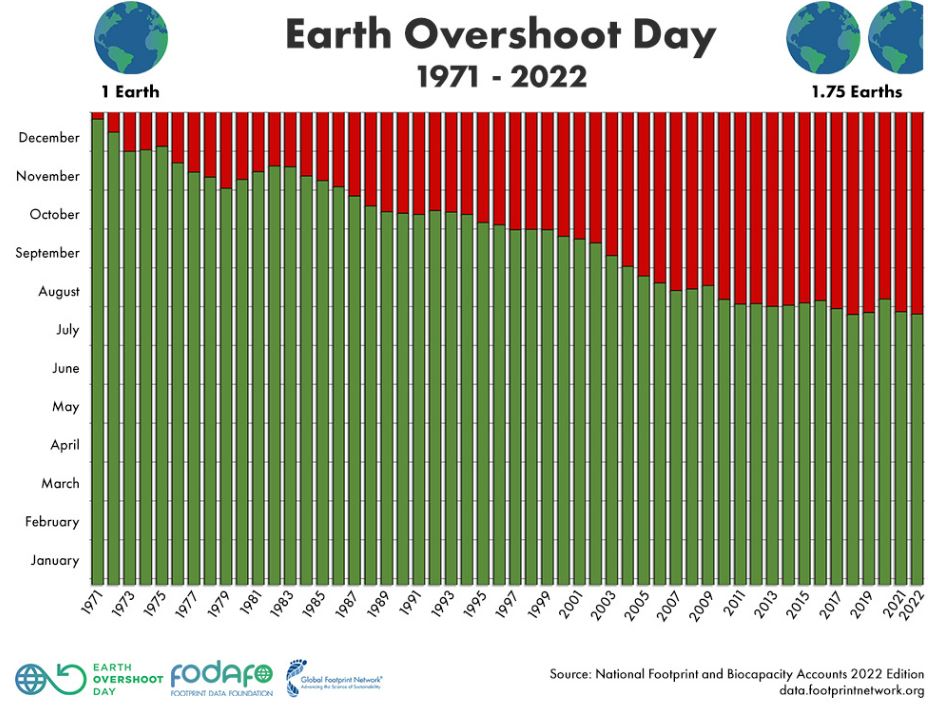We have only one planet
Is one planet enough? This was the question that kicked-off the excellent seminar “Insights into Energy and Mineral Blindness”, arranged on 8th of August by GTK, the Geological Survey of Finland. I think it is clear to almost everyone that one planet is currently not enough. The Earth overshoot day has continued to come earlier and earlier each year:
Thus, it was great to attend the GTK seminar, listen to the interesting keynotes, and take part in the workshops to create ideas together with the other participants. It gives hope to see so many motivated people together who want to discuss honestly and openly and create ideas that can help to find solutions to the energy and mineral issues at hand. The day was full of information, and I’ll summarize some thoughts and takeaways in this blog. For the full report by GTK, I encourage to check this link: It’s Time to Wake Up
However, I want to start with a personal story first.
Courage
In the beginning of this year, I made a plan. It was to test what happens if I do not let fear or insecurity stop me of trying or pursuing things that are important to me. I wanted to dare to do things that I feel valuable, but which might seem challenging or difficult, or even scary.
I started with small things. Like downhill skiing. I had not done that in the last 15 years and had some bad experiences with it. I kind of first thought that I just don’t like downhill skiing. But after some thinking, I had to admit to myself that I’m just afraid that I will hurt myself or look very stupid since I’m not that good in it. Thus, I felt I should not transfer my prejudice and fear to my son who wanted to learn it. So, I rented a pair of skis and forced myself into the ski lift (T-bar ski lifts are the scariest part for me 😉). Everything ended up well (of course!) and my son really liked it.
This blog was also part of my “dare” exercise. And I’m super happy that I started it!
My blog also gave me a possibility for a TV interview! I was invited to a morning show in Finnish national TV due to this blog. It was great to be able to share battery related information to the public. Again, it was exciting as well. But a wonderful experience. Here I’m in the studio and you can see the weather broadcast in the background, showing the extremely high temperatures in Europe. Exactly the reason why I like working with batteries. They are one of the key solutions to stop global warming.

If you are interested and understand Finnish, you can watch the interview here: VTT:n erikoistutkija Marja Vilkman on perehtynyt akkujen maailmaan
Just before my summer holidays, I also decided that I would apply for a research chair position in BEPA, the Batteries European Partnership Association, which is responsible for creating the Strategic Research and Innovation Agenda (SRIA) for batteries, together with Batteries Europe, and for the definition of call topics to be included in the Horizon Europe Work Programmes. As sufficiency of battery materials is a very important topic for me, I chose to apply to become the research chair for the Working Group of Raw Materials and Recycling.
And guess what. I was selected! Wow!! Thus, you might be reading more on the European level road mapping in my future blogs. I’m also very eager to hear your thoughts about the directions EU should take in this field. We will create the SRIA together.
Takeaways from the GTK seminar
Now to the takeaways. Without filtering and not including everything. These are however the parts that I remember well from the workshop.
-
Reducing CO2 emissions is a must to stop global warming. The solution would be to use renewable energy (mostly wind & solar) to harvest energy, combined with energy storage (like batteries, but there are also other options). However, 80 % of modern energy use is non-electric. It is a huge task to electrify everything. And it requires massive amounts of raw materials.
-
Even if we would not care about the greenhouse gas emissions, we still need to find solutions to replace oil and gas. The easiest sources for oil have been already found and used. We will at some point run out of oil. And even sooner, the oil prices will become too expensive for the consumers and, at the same time, too low for the producers to make profit.
- Solar and wind energy is renewable and the available energy from the sun would be more than enough to generate the energy we need. The problems are that:
- Renewable energy is not always available – we need to be able to store it
- Solar panels and wind turbines need materials that are not renewable
- The devices to store the energy also need materials that are not renewable (yes, in some cases we can use renewable materials, like biocarbon in batteries – but it is unfortunately not enough, even though definitely needed)
-
The world is based on the concept of continuous economic growth. In history, economic growth has gone hand in hand with the increased energy consumption. There is no silver bullet to enable economic growth without increased energy consumption. And even though we will have solutions to produce energy in a clean way, it will require raw materials that are limited on Earth. Eventually, there will be a limit.
-
We do not have much time to find solutions. But building wind farms and solar power plants takes time. Setting up battery factories takes time. And opening new mines takes even more time.
-
What we can and need to do fast, is to consume less. It will give us time to develop greener energy solutions. And it is also needed to secure sufficiency and sustainable mining of battery raw materials in future.
- One of the solutions is to favor local production. A lot of energy is consumed in too long supply chains. Sometimes the supply chains are even ridiculous, like fishing salmon in Scotland, shipping it to Asia to be canned, and then shipped back to Scotland. Instead, locals could have bought fresh salmon directly from the fishermen and avoid the 32 914 km travel to be canned and back.
My conclusions
Yes, battery materials are needed in huge amounts. I often hear that if there is more demand, new materials will be developed, and new raw material sources will be found as much as needed.
I remember from school that it was quite scary, as a child, to hear that we will run out of oil soon. But new oil deposits have been found and I believe it took/takes longer than originally estimated to reach the point when oil production is not profitable anymore, due to increased costs in oil drilling from the smaller and smaller deposits. But we are anyway approaching this limit.
There is, eventually, a limit also for battery materials. But battery materials differ from oil so that they are not consumed when used. Only the battery properties will get worse, for example due to cracks that are generated into the electrodes during cycling. So, at some point, we will have large amounts of battery raw materials coming from recycled batteries. Not yet though, and we need to increase raw material production still significantly.
As I mentioned also in the TV interview: In case we would stop battery research and development now, we would run out of raw materials. But we of course will not do that. Novel, more abundant, and even renewable battery materials, increased battery lifetime, and recycling of used batteries will all help to guarantee that we will have enough batteries in future. We can and should also utilize artificial intelligence and modelling to speed up the development.
Thus, the GTK report should NOT be taken as a sign to give up or stop EV or renewable energy investments, which is how some people seem to have interpreted the message. On the contrary: It was a wake-up call and a call to action to put more efforts on such work, both in the research field and in industry – and in politics.
Feelings were also mentioned in the seminar. And what I would like to see more is that people would listen to each other. If people and their concerns are not heard, the progress will be slow. We need to share information and reasons for the EV and renewable energy need in a clear way and listen to the consumers and locals who live near planned wind farm or mines – and take their possible fears seriously. Thus, it is not just developing new materials and technologies. Social acceptance is very important as well and should be considered also in technical research projects.
I would like to finish this blog text with a positive note. This is anyway a positive energy blog 😉 This week, a big group of researchers published a paper, which says that the world can reach a 100% renewable energy system by or before 2050. So yes, we can do this. But we need to make bold decisions and dare “to stop all new investments in fossil fuels and focus on creating renewable energy based smart energy systems”, as pointed out by one of the authors, Brian V. Mathiesen from Aalborg University.
